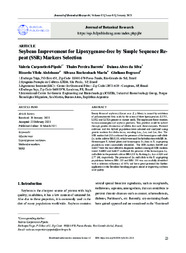Soybean improvement for lipoxygenase-free by simple sequence repeat (SSR) markers selection.
Soybean improvement for lipoxygenase-free by simple sequence repeat (SSR) markers selection.
Autoria: CARPENTIERI-PIPOLO, V.; BARRETO, T. P.; SILVA, D. A. da; ABDELNOOR, R. V.; MARIN, S. R. R.; DEGRASSI, G.
Resumo: Beany flavor of soybean (Glycine max (L.) Merr.) is caused by oxidation of polyunsaturated fatty acids by the action of three lipoxygenases (LOX1, LOX2 and LOX3) present in mature seeds. The unpleasant flavor restricts human consumption of soybean products. This problem could be solved through genetic elimination of alleles that code these enzymes. Parental cultivars and two hybrid population were selected and analyzed using genetic markers for alleles locus, encoding Lox1, Lox2 and Lox3 free. The SSR marker Satt212 confirmed the presence of the homozygous null-allele Lx3 in the cultivar BRS 213, which were used for hybridization with BR 36. Heterozygote F1 hybrid plants and homozygous Lx3 lines in F2 segregating populations were successfully identified. The SSR markers Sat090 and Sat417 were the most effective diagnostic markers among all SSR markers tested. Satt090 and Satt417 confirmed the presence of the homozygous Lx2 null-allele in the parental cultivar BRS 213 by flanking Lx2 loci at 3,00 and 2,77 cM, respectively. The presence of Lx2 null allele in the F2 segregating populations between BRS 213 and BRS 155 were successfully identified with a selection efficiency of 98% and have great potential for further application in the Brazilian breeding program aimed at improving soybean seed quality. Index terms: Glycine max, lipoxygenase isozymes, molecular markers, MAS
Ano de publicação: 2021
Tipo de publicação: Artigo de periódico
Unidade: Embrapa Trigo
Observações
1 - Por padrão são exibidas publicações dos últimos 20 anos. Para encontrar publicações mais antigas, configure o filtro ano de publicação, colocando o ano a partir do qual você deseja encontrar publicações. O filtro está na coluna da esquerda na busca acima.
2 - Para ler algumas publicações da Embrapa (apenas as que estão em formato ePub), é necessário ter, no celular ou computador, um desses softwares gratuitos. Sistemas Android: Google Play Livros; IOS: iBooks; Windows e Linux: software Calibre.
Acesse outras publicações
Acesse a Base de Dados da Pesquisa Agropecuária (BDPA) para consultar o acervo completo das bibliotecas da Embrapa.

